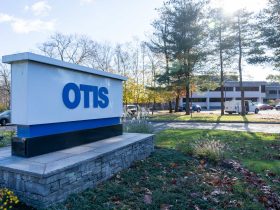We started buying semiconductor giant Broadcom (AVGO) last month and added to our position a few times since it reported fiscal third-quarter results Aug. 31. We would’ve done so again Thursday, if not for restrictions, as the stock fell on a news report about its relationship with a key customer. What drew us to this name – and the reason why we made the switch out of PC and data-center chip designer Advanced Micro Devices (AMD) – is Broadcom’s clear benefits from artificial intelligence. Investment in generative AI is fueling a wave of spending by hyperscaler customers for Broadcom’s networking solutions, including one large customer of advanced AI processor chips. That customer is Google parent Alphabet (GOOGL), and a report Thursday in tech-focused publication The Information said execs at Google have discussed dropping Broadcom as a supplier of these chips as early as 2027 to cut down on costs, pulling Broadcom shares sharply lower. This sounded like one big price negotiation to us — given it’d be dangerous for Google to risk performance to save money — and Google has since come out to downplay the report. “We are productively engaged with Broadcom and multiple other suppliers for the long term,” the company said in a statement to CNBC’s Kristina Partsinevelos. “Our work to meet our internal and external Cloud needs benefit from our collaboration with Broadcom; they have been an excellent partner and we see no change in our engagement.” Indeed, the Thursday morning sell-off in Broadcom, which was down 4.3% at its intraday lows, is an overreaction. And, as Jim Cramer indicated Thursday during September’s Monthly Meeting for Club members, we wanted to buy into that weakness. As the market digested Google’s statement, Broadcom shares were now down just over 1%, to around $821 each. AVGO YTD mountain Broadcom’s year-to-date stock performance. Broadcom also supplies several hyperscalers with a portfolio of networking technologies as they scale up and scale out their AI clusters within their data centers. AI-related revenues are helping lift Broadcom’s growth rate. In the recent quarter, Broadcom said it expects networking revenue growth to accelerate above 20% year over year, with AI-related revenues growing 50% sequentially and nearly double year over year. While Broadcom’s AI revenue is growth is growing incredibly fast, the rest of its semiconductor business is stabilizing after working through its post-Covid inventory gluts. This would be a wireless chips business whose main customer is fellow Club name Apple (AAPL), as well as server storage connectivity, broadband and industrial. But the Broadcom story is more than just semis. Over the past several years, Broadcom has leaned on mergers and acquisitions to build up a stable, recurring-revenue-generating Infrastructure Software business. This business will soon significantly increase in scale and Broadcom will cement its position as a leading provider of mission-critical software to enterprises after it completes its $61 billion acquisition of VMware (VM). In fact, with the additional of VMware, Broadcom’s companywide revenues will be about half semiconductor and half software. Broadcom believes VMware “sits at the nexus of the largest opportunity in enterprise infrastructure software today.” Broadcom believes VMware “is a foundational platform that enables enterprises to drive competitive advantage with technology by leveraging two operational modes to develop and run their applications.” In simpler terms, VMware’s multi-cloud portfolio makes it possible for enterprises to develop and run their apps anywhere. They serve as the foundation for crucial applications across private and public clouds. Broadcom has a strong track record of acquiring growing businesses and increasing profits by eliminating costs and driving efficiency. Using this playbook, Broadcom is targeting to increase VMware’s standalone EBITDA of approximately $4.7 billion in fiscal year 2022 to $8.5 billion in pro-forma run-rate EBITDA within three years of the deal closing. EBITDA stands for earnings before interest taxes depreciation and amortization. There’s also a major AI component here, too. VMware and Club holding Nvidia (NVDA), the kingmaker of AI, are working together on a strategic partnership “to ready the hundreds of thousands of enterprises that run on VMware’s cloud infrastructure for the era of generative AI.” That’s another reason to like Broadcom. Broadcom is also compelling within semiconductors because of its valuation and capital returns. Unlike some other semiconductor companies that trade at expensive price-to-earnings multiples, Broadcom is much cheaper at roughly 19x its next 12-month earnings. That’s a discount to analog chip firm Texas Instruments (TXN), AMD, Intel (INTC), Marvell, and, of course, Nvidia. Broadcom also has a storied history of returning cash to shareholders. It typically pays out to shareholders about 50% of its prior year cash flow as dividends and it has raised its annual dividend 12 times since it initiated a dividend in fiscal 2011. The stock’s current yield is about 2.15%. Broadcom uses excess free cash flow to repurchase stock and shrink its outstanding share count. The company’s buyback was put on pause in early August in accordance with the rules around its pending acquisition of VMware, but it still has $7.3 billion remaining under its authorization. We would expect repurchases to resume sometime after the deal closes. (Jim Cramer’s Charitable Trust is long AVGO, GOOGL, AAPL and NVDA . See here for a full list of the stocks.) As a subscriber to the CNBC Investing Club with Jim Cramer, you will receive a trade alert before Jim makes a trade. Jim waits 45 minutes after sending a trade alert before buying or selling a stock in his charitable trust’s portfolio. If Jim has talked about a stock on CNBC TV, he waits 72 hours after issuing the trade alert before executing the trade. THE ABOVE INVESTING CLUB INFORMATION IS SUBJECT TO OUR TERMS AND CONDITIONS AND PRIVACY POLICY , TOGETHER WITH OUR DISCLAIMER . NO FIDUCIARY OBLIGATION OR DUTY EXISTS, OR IS CREATED, BY VIRTUE OF YOUR RECEIPT OF ANY INFORMATION PROVIDED IN CONNECTION WITH THE INVESTING CLUB. NO SPECIFIC OUTCOME OR PROFIT IS GUARANTEED.
We started buying semiconductor giant Broadcom (AVGO) last month and added to our position a few times since it reported fiscal third-quarter results Aug. 31. We would’ve done so again Thursday, if not for restrictions, as the stock fell on a news report about its relationship with a key customer.
Read the full article here









Leave a Reply